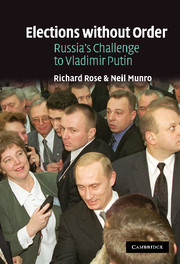Book contents
- Frontmatter
- Contents
- List of figures
- List of tables
- Introduction. The reality of Russia
- 1 A disorderly legacy
- 2 Democratization backwards
- 3 What Russians have made of transformation
- 4 Presidential succession: a Family problem
- 5 Parties without accountability
- 6 A floating system of parties
- 7 Impact of transformation on Duma voters
- 8 From acting to elected president
- 9 Campaigning and governing
- 10 In search of an equilibrium
- Appendix A New Russia Barometer samples
- Appendix B Coding of independent variables
- References
- Index
10 - In search of an equilibrium
Published online by Cambridge University Press: 22 September 2009
- Frontmatter
- Contents
- List of figures
- List of tables
- Introduction. The reality of Russia
- 1 A disorderly legacy
- 2 Democratization backwards
- 3 What Russians have made of transformation
- 4 Presidential succession: a Family problem
- 5 Parties without accountability
- 6 A floating system of parties
- 7 Impact of transformation on Duma voters
- 8 From acting to elected president
- 9 Campaigning and governing
- 10 In search of an equilibrium
- Appendix A New Russia Barometer samples
- Appendix B Coding of independent variables
- References
- Index
Summary
The period of unpredictable transformation in Russia now appears to be coming to a close. Decisions taken a decade ago cannot easily be reversed; the probability that next year will be similar to this year is far greater in 2002 than it was in 1992. Political inertia makes incremental change more likely. However, settling down can be interpreted in several ways – putting a stop to a deteriorating situation; maintaining the status quo; or laying foundations for progress.
A chronicle of Russia in the past decade is full of shock events affecting everyday life. A sequence of shocks encourages the view that Russian politics is one damned thing after another, that there is no rhyme or reason in events as each shock is independent of what went before. In statistical terms, this can be described as a random walk, an apt metaphor for the pillar-to-post lurches of Russian government under Boris Yeltsin. In such a situation, the churning of politicians, policies and resources does not produce improvement nor does it lead to deterioration. Cumulatively, a random walk goes nowhere. From the perspective of the ordinary Russian, going nowhere is preferable to becoming worse off. Yet any sequence of events over ten years, 120 months and 3,652 days is bound to form a pattern of some kind (Rose, 2002a).
The spectre haunting Russia is not that of a return to Communism or a turn toward fascist nationalism; it is the risk of going nowhere.
- Type
- Chapter
- Information
- Elections without OrderRussia's Challenge to Vladimir Putin, pp. 218 - 239Publisher: Cambridge University PressPrint publication year: 2002



